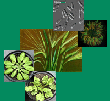Die physiologische Bedeutung mischfunktioneller Aquaglyceroporine aus Arabidopsis thaliana unter variierenden Bodenbedingungen
DFG We1680/5
From 01/2000 to 08/2005Principal Investigator: Alfons Weig
Staff: Christiane Jakob
Aquaporins are the molecular basis of transmembrane water flow in many biological membranes. Most of the plant aquaporins of the plasma membrane and the tonoplast are quite specific for water. One subgroup of the MIP gene family however encodes so-called aquaglyceroporins which allow the diffusion of water and glycerol (and may be other small solutes) across the membrane. These proteins are called NIP (for: Nod26-like Instrnsic Proteins), because the first member of this protein group was identified in the peribacteroid membrane of root nodules in soybean. The Arabidopsis genome project allowed us to identify nine genes of this NIP subgroup. In this project we are investigating the transport activity of these transport proteins by heterologous expression in yeast and Xenopus oocytes and the expression profile in Arabidopsis plants under different growth conditions to further elucidate the possible biological role of these membrane transport proteins.
List of publications of this Project
| Weig, A R; Jakob, C: Functional identification of the glycerol permease activity of Arabidopsis thaliana NLM1 and NLM2 proteins by heterologous expression in Saccharomyces cerevisiae, FEBS Letters, 481, 293-298 (2000), doi:10.1016/S0014-5793(00)02027-5 -- Details |
| Weig, A R; Jakob, C: Functional chracterisation of Arabidopsis thaliana aquaglyceroporins in Hohmann, S; Nielsen, S: Molecular biology and physiology of water and solute transport, Kluwer Academic/Plenum Publishers, 365-372 (2000) |

